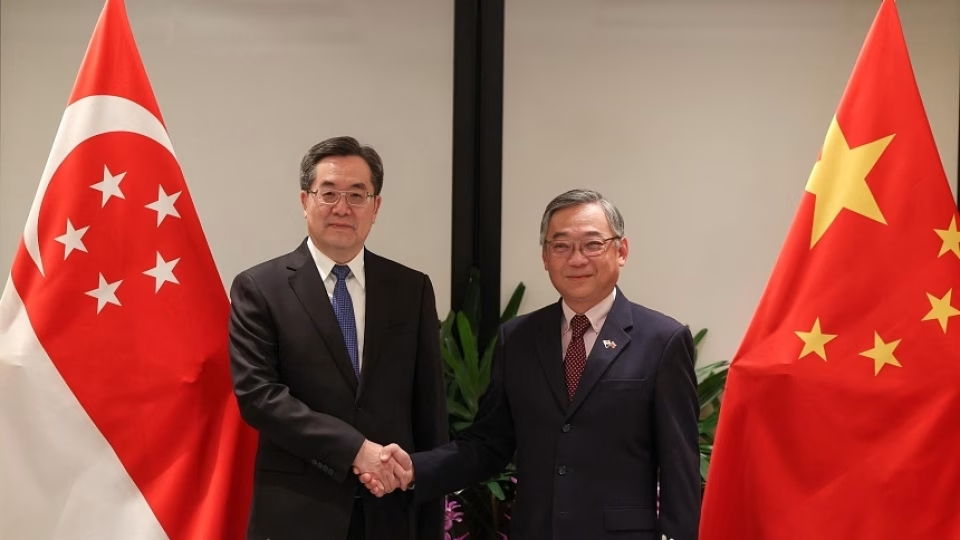November 12, 2024
SINGAPORE – Singapore and China took steps to refresh their relationship and deepen collaboration in areas such as trade and finance at the apex bilateral cooperation meeting between the two countries on Nov 11.
At the first Joint Council for Bilateral Cooperation (JCBC) meeting held since Mr Lawrence Wong took the helm in Singapore as prime minister in May, progress and continuity were stressed amid the leadership transition.
“With every new generation of leaders, you need to refresh the relationship, continue to strengthen mutual understanding, so that you can build trust and confidence with one another,” Deputy Prime Minister Gan Kim Yong, who took over from PM Wong as JCBC co-chair in 2024, told the Singapore media after a series of meetings held under the umbrella of JCBC on Nov 11.
Leaders from both sides agreed to continue to collaborate and tap opportunities in emerging areas to deliver high-quality outcomes that will benefit both countries and contribute to regional prosperity, a statement from the Prime Minister’s Office said.
Mr Gan said he had a “fruitful and substantive” discussion with his Chinese counterpart, Vice-Premier Ding Xuexiang, who had taken over from then Vice-Premier Han Zheng in 2023 after the Chinese government started a new five-year term under President Xi Jinping.
Leadership transition notwithstanding, Singapore continues to nurture ties with China, while adapting to new challenges and opportunities.
Mr Gan pointed out that PM Wong is not new to China, having co-chaired the JCBC with Mr Ding in China in 2023.
This year, when it was Mr Ding’s turn to visit Singapore, he met PM Wong again, and also President Tharman Shanmugaratnam and Senior Minister and Coordinating Minister for National Security Teo Chee Hean.
At this year’s JCBC meeting, both sides announced 25 memorandums of understanding and agreements in areas ranging from China’s Belt and Road Initiative to trade, investment and finance.
Most notably, both countries agreed to ensure that a protocol to further upgrade the China-Singapore Free Trade Agreement will enter into force on Dec 31, 2024, thereby making it easier for Singapore investors and service suppliers to invest and trade in China.
Both countries are also looking to expand nationwide a Green and Digital Shipping Corridor, a maritime innovation collaboration currently implemented only in the eastern province of Shandong and the north-eastern city of Tianjin.
Transport Minister Chee Hong Tat told reporters after the meeting that both countries are exploring how to strengthen supply chain resilience and increase flight connectivity. The volume of passengers and number of flights between the two countries have already bounced back and surpassed pre-pandemic levels.
Both sides also discussed projects like the Suzhou Industrial Park (SIP), which is the first government-to-government project between the two countries and marks its 30th anniversary in 2024.
Minister for Education and Minister-in-charge of SIP Chan Chun Sing told reporters that both sides will explore opportunities to cooperate in green development, biomedical sciences and digital economy at the SIP.
He said the SIP has evolved to become a township that takes into account some of the social challenges faced by China, such as an ageing population and the need to care for workers who come from other parts of China to work in Suzhou, a city in south-eastern Jiangsu province.
Both sides also agreed to strengthen the Tianjin Eco-City, the second government-to-government project, as a test-bed for green enterprises to trial new ideas.
As for the China-Singapore (Chongqing) Demonstration Initiative on Strategic Connectivity, the third government-to-government project, both sides agreed to explore new initiatives in green economy and to set up a cross-border digital trade platform.
Dr Koh Poh Koon, Senior Minister of State for Sustainability and the Environment, told reporters that both countries will cooperate further on food security, such as by harmonising inspection standards. This is important as China is Singapore’s second-largest source of fresh fruits and vegetables and its fourth-largest source of seafood.
With Donald Trump poised to return to the White House after winning the recent US presidential election, countries including China and Singapore are bracing themselves for stiffer tariffs and trade disruptions.
Asked about this, Mr Gan said: “The operating environment going forward is likely to be very challenging and continue to have significant uncertainties.”
He pointed out that a stable and secure relationship between China and the US will benefit a small and open economy like Singapore. “We will encourage the US and China to continue to dialogue and find ways to work together even as they compete with one another,” he said.
He also urged Singapore businesses to be nimble and flexible. “Be prepared to adjust our strategy even as the global environment evolves.”
Mr Chan, meanwhile, stressed that Singapore takes a long-term perspective on China.
“We look beyond the short-term perturbations. Underlying that is a deep sense of trust and respect for one another,” he said. “We are also not complacent. We are constantly on the lookout to better understand the latest challenges that China are grappling with, the latest opportunities.”
To commemorate the 20th anniversary of the JCBC this year, Mr Gan and Mr Ding unveiled a sculpture designed by students and faculty from Singapore University of Technology and Design which is made using 3D printing.

